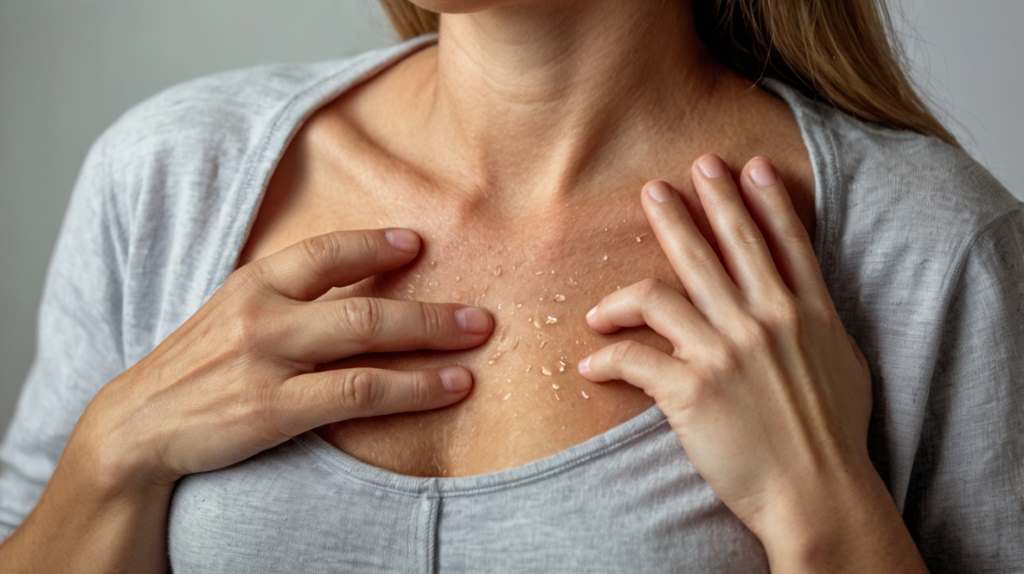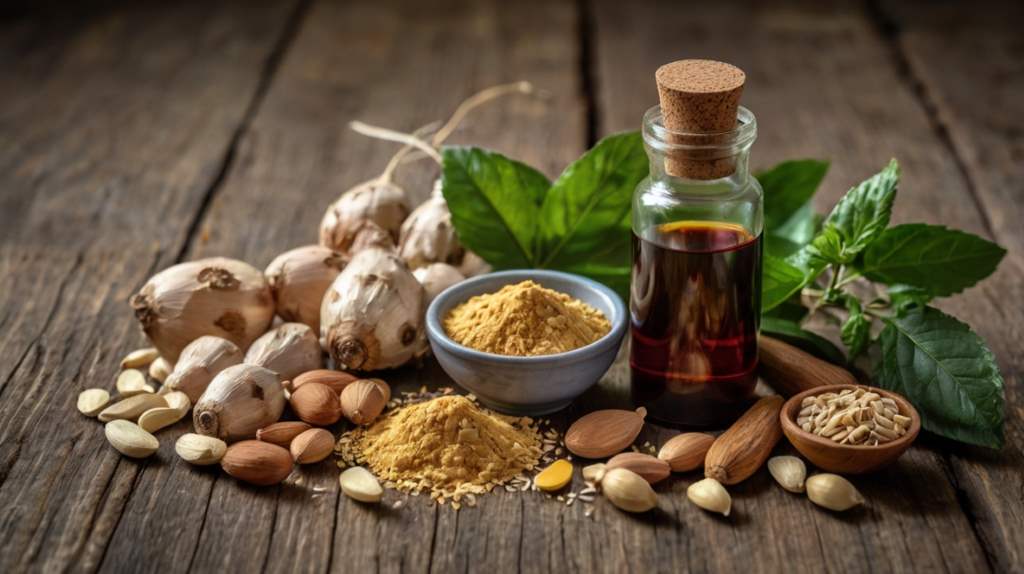Experiencing chest pain can be scary. It often makes us look for quick relief. While getting help from a doctor should come first, knowing what might be causing your chest pain can help you feel more in control. Looking into home remedies can also be useful. This article will help you learn about different home remedies for chest pain. It will give you knowledge about possible causes and how to relieve pain safely and effectively.
Understanding Chest Pain: Causes and Symptoms
Chest pain can come from many reasons. It can be mild or a sign of serious health conditions like heart disease. It’s important to know that some chest pain is about the heart, but other times it can come from the lungs, muscles, or digestion problems.
If you feel chest pain for the first time or it seems unusual, get medical help right away. This can help find any serious issues. One common cause of chest pain is acid reflux, which you may know as heartburn. Muscle strain from exercise or injury can also cause discomfort in the chest area.
Differentiating Between Heart-Related and Non-Heart-Related Chest Pain
Chest pain from a heart attack is very different from other kinds of chest discomfort. Heartburn from gastroesophageal reflux disease (GERD) usually feels like a burning under the breastbone. In contrast, a heart attack often feels like pressure, squeezing, or even a crushing pain in the chest.
Heart-related pain might also spread to the arms, jaw, back, or neck. This can be an important warning sign. Not everyone has the same symptoms during a heart attack. The strength and length of these symptoms can vary a lot.
If your chest pain doesn’t go away, comes back, or is linked with other serious symptoms like shortness of breath, nausea, or sweating, it’s very important to take care of your health and get medical attention right away. Catching heart problems early can help treat cardiovascular disease and may even save lives.
Common Symptoms Associated with Chest Pain
Chest pain is a serious condition. It often comes with other common symptoms. These symptoms are important because they can help you know if your chest pain needs immediate medical attention.
Symptoms of a heart attack include pain that spreads to the jaw, neck, back, or arms. You should never ignore these signs. Other symptoms are shortness of breath, sweating, nausea, and feeling lightheaded. These can also mean a heart attack and mean you need medical care right away.
Knowing these symptoms and acting quickly can make a big difference in a heart emergency. So, it is better to be cautious. If you think your chest pain is heart-related, get medical help fast.
Immediate Home Remedies for Chest Pain
It is very important to talk to a healthcare professional if you have chest pain that does not get better or gets worse. However, there are some quick ways to help ease the pain and make you feel more relaxed. Keep in mind that these home remedies for chest pain are not a replacement for professional medical advice. They are meant to provide temporary relief while you look into the main cause of the pain.
Here are some easy and effective ways to quickly relieve chest pain using simple techniques and natural ingredients.
The Role of Deep Breathing Techniques
Deep breathing can really help with chest pain, especially if stress or anxiety is to blame. When you slow down your breathing, your body starts to relax. This helps lower your heart rate and blood pressure. As a result, blood flow improves, which can reduce tension and chest discomfort.
To practice deep breathing, sit or lie down comfortably. Breathe in slowly through your nose, filling your belly with air. Hold the breath for a few seconds, then breathe out slowly through your mouth. Do this a few times. It can calm your nerves, relax your muscles, and reduce chest pain.
Doing deep breathing exercises regularly, even when you are not feeling chest pain, can help you feel better overall and manage stress.
Using Warm Compresses Effectively
Applying a warm compress to your chest can help ease chest pain, especially if it comes from muscle pain. The gentle heat can relax tight muscles, ease soreness, and make pain feel less intense. Enjoying a warm drink while using the compress can make you feel even more relaxed and comfortable.
You might also want to try other ways to relax. Listening to calming music or doing some gentle stretches can go well with warm compresses. This way, you can treat pain in a more complete manner, helping you feel calm and good.
Just remember to use a warm compress instead of a hot one. This will help you avoid the chance of getting burns.
Natural Ingredients for Chest Pain Relief
Nature has many helpful remedies that people have valued for their healing powers for hundreds of years. If you have chest pain, some natural ingredients can help by reducing inflammation and soothing discomfort. Using these remedies can improve your overall health while providing relief from chest pain.
The Healing Powers of Garlic
Garlic, a staple ingredient in many cuisines, boasts more than just flavor; it harbors potent properties that can contribute to heart health and reduce chest pain. At the heart of garlic’s health benefits lies allicin, a sulfur-containing compound released when garlic is crushed or chopped. Allicin has been linked to lowering blood pressure, which can contribute to chest discomfort if elevated.
|
Property |
Benefit |
|
Lowers Blood Pressure |
Reduces strain on the heart |
|
Improves Blood Flow |
Enhances oxygen delivery, easing pain |
|
Anti-Inflammatory |
Decreases inflammation associated with chest pain |
Consuming garlic regularly, whether incorporated into your meals or taken as a supplement, can support overall heart health and potentially alleviate chest pain. However, it’s essential to remember that garlic can interact with certain medications, so consulting your healthcare provider before incorporating large amounts into your diet and home remedies for chest pain is crucial.
Turmeric Milk: A Traditional Remedy
Turmeric is a bright yellow spice that is often used in Indian dishes. It is well-known for its strong anti-inflammatory properties. These properties come from a compound called curcumin. Because of this, turmeric can be a good natural remedy for chest pain, especially when inflammation plays a role.
Turmeric milk is a popular drink in many cultures. It is a warm and easy way to enjoy turmeric. To make it, just add a teaspoon of turmeric powder to a cup of warm milk. You can also add honey or ginger for extra flavor.
The warmth of the milk, combined with the healing effects of curcumin, helps ease chest pain and can make you feel more relaxed. Drinking turmeric milk regularly may help you manage pain and improve your overall health.
The Benefits of Ginger in Reducing Pain
Ginger is a powerful natural ingredient. It can help with chest pain, especially if it’s caused by digestive problems. Ginger works well to calm digestive discomfort by getting rid of excess gas. That gas can often cause chest pain.
Ginger also has anti-inflammatory effects. This can lower any swelling that might be leading to chest pain. You can easily add ginger to your meals. Just put a slice in your tea or hot water, or use it in savory food.
If you want a stronger ginger option, try ginger chews or ginger supplements. But if you are pregnant, breastfeeding, or taking blood thinners, you should talk to your healthcare provider before taking large amounts of ginger.
Lifestyle Adjustments for Preventing Chest Pain
It is very important to deal with chest pain quickly. However, it is just as important to take actions that can help your heart health in the long run. Making small changes in your daily life can greatly improve your well-being and make your heart stronger.
You should focus on making lasting changes in your lifestyle. This means being active regularly and eating food that is good for your heart. Doing these things can lead to a healthier and more lively life.
Importance of Regular Exercise
Engaging in regular exercise is more than just a task; it’s a way to support your heart health. Adding physical activity to your daily life helps strengthen your heart, improves blood flow, and boosts cardiovascular fitness. Better blood flow reduces stress on your heart. It helps your heart pump blood more efficiently and lowers the chances of chest pain.
Pick an activity that you enjoy. Make sure it fits nicely into your day. This will help you stick with it over time. Start slowly. As your fitness gets better, you can slowly make your workouts longer and tougher.
Exercise not only helps your heart health, but it also releases endorphins. These are natural mood lifters that can reduce stress and anxiety, which can lead to chest pain.
Dietary Changes for a Healthy Heart
Embracing a heart-healthy diet is very important to prevent chest pain. Choose to eat a lot of fruits, vegetables, whole grains, and lean proteins. At the same time, cut back on saturated fats, trans fats, sodium, and processed foods. These choices can help keep your cholesterol and blood pressure at healthy levels. This way, you reduce your risk of heart disease and chest pain.
Omega-3 fatty acids are good for heart health. You can find them in fatty fish like salmon, walnuts, and flax seeds. Omega-3s have strong anti-inflammatory effects. They also help improve blood flow and support your overall heart health.
By making small but steady changes to what you eat, you can build a healthy and long-lasting diet. This will support your heart and lower your chances of chest pain.
When to Seek Medical Attention
While home remedies can help with chest pain, it is important to know when to get medical attention right away. Some warning signs show that there could be a serious condition that needs quick help. Not paying attention to these signs can lead to serious problems, so it is better to be careful.
If your chest pain is really bad, lasts for more than a few minutes, or happens with other symptoms like trouble breathing, sweating, feeling sick, dizziness, or pain spreading to your arms, jaw, or back, go to the emergency room right away. These symptoms might mean a heart attack or another life-threatening issue that needs urgent medical care. Always remember that quick help is crucial in these cases.
Warning Signs That Should Not Be Ignored
Experiencing chest pain can be very frightening. It is important to know the signs that mean you need medical care. If you think your chest pain might mean a heart attack, get help from healthcare professionals right away.
If you also feel shortness of breath, sweating a lot, nausea, or lightheadedness, these are serious symptoms. You should call emergency services immediately. Even if your chest pain is strong and goes away, do not wait to get help.
Remember, early action can really help your heart health.
The Difference Between Emergency Situations and General Discomfort
Telling the difference between a serious emergency and simple discomfort when you have chest pain can save your life. If you feel severe pain or if it comes with scary symptoms like shortness of breath, dizziness, or sweating, you should go to the emergency room or call for help right away.
But if your chest pain is mild, comes and goes, and does not have the serious symptoms I mentioned, it’s a good idea to see your primary care physician or visit an urgent care center. Keep in mind that while home remedies might give you some relief, they can’t replace getting real medical advice.
Finding out what is causing your chest pain and getting the right diagnosis from a healthcare provider is important. It helps make sure you get the right care and treatment.
Key Highlights of Home Remedies for Chest Pain
- While chest pain can indicate a serious medical issue like a heart attack, it can also stem from less severe causes like muscle strain or acid reflux.
- This blog post offers insights into differentiating between heart-related and non-heart-related chest pain, along with quick home remedies for relief.
- From deep breathing exercises and warm compresses to the use of natural ingredients like garlic, turmeric, and ginger, we explore diverse approaches for managing chest pain at home.
- The significance of lifestyle changes, including a heart-healthy diet and regular exercise, is also emphasized in preventing future occurrences of chest pain.
- Remember, home remedies are not a substitute for professional medical advice.
Conclusion
Taking care of your mental health is very important. It helps you feel good overall. Focus on home remedies for chest pain that support your mental wellness. If you need help, don’t hesitate to ask for it. Remember, mental health matters just as much as physical health. It should be treated with care and attention. Having a supportive space and handling mental health issues early can improve life for you and those close to you. Let’s join efforts to talk about mental health and raise awareness together.










